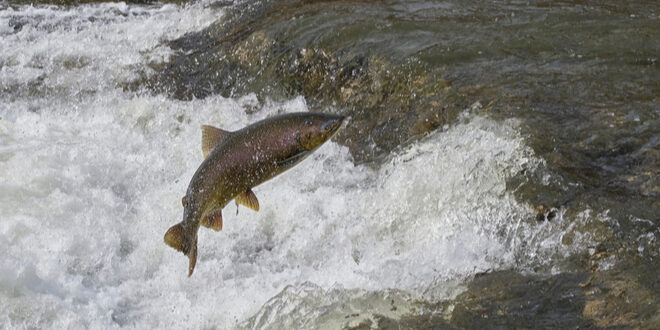The California Department of Fish and Wildlife (CDFW) and the California Department of Water Resources (DWR) have announced a joint effort at the Feather River Fish Hatchery in Butte County to aid in offsetting impacts to spring-run and fall-run Chinook salmon resulting from this year’s extreme drought conditions.
Under this joint initiative, CDFW and DWR are taking a two-part approach supporting Feather River salmon populations to guard against impacts observed during the state’s last multi-year drought, as well as protect against impacts observed in recent years due to a nutrient deficiency.
“During California’s last extended drought, we observed significant declines in Sacramento Valley fall-run Chinook salmon stock contributions to the state’s sport and commercial fishery,” said Colin Purdy, environmental program manager for fisheries in CDFW’s North Central Region. “We’re trying to get ahead of any drought-related impacts this time by taking these actions and trying to keep these populations as stable and healthy as we can.”
First, the agencies will try to increase the number of spring-run Chinook salmon successfully spawning in-river by returning healthy adults that have returned to Feather River Fish Hatchery that are in excess of those needed to meet hatchery production goals and have been treated with a nutrient supplement. Second, in anticipation of decreased recruitment to the ocean fishery, fall-run Chinook salmon production at the hatchery will be increased from 6 million to 7.75 million smolts.
“Even though wild salmon and hatcheries are well studied throughout California and the Pacific Northwest, our community of dedicated state, federal and university scientists continues to uncover new information,” said Jason Kindopp, manager of DWR’s Feather River Program. “Managing hatcheries and salmon populations presents new challenges every season and using the best data available helps inform our actions to fit the moment.”
Earlier this spring, adult spring-run Chinook salmon collected at the Feather River Fish Hatchery were provided a thiamine supplement injection to protect against impacts from Thiamine Deficiency Complex (TDC). TDC was first observed in Central Valley Chinook populations in 2019, and results in early egg and fry mortality in progeny from affected adults. This year, once spring-run spawning production goals are met, the hatchery will return any excess, healthy adult broodstock that have been treated for TDC back to the river to spawn naturally and promote in-river production.
“The thiamine deficiency has been showing up in returning adults these past few years due to a change in ocean food resources. This year, providing the thiamine supplement at the hatchery will help production both at the hatchery and in the natural spawning areas,” said Jason Julienne, senior environmental scientist, supervisor for CDFW’s North Central Region Hatchery Program. “By returning thiamine supplemented adults to the river we can maximize the benefit of that action to the Feather River spring-run population.”
The spawning of spring-run Chinook salmon by CDFW staff during September was successful with more than 3 million eggs harvested. The spawning of fall-run Chinook salmon at the Feather River Fish Hatchery will begin in early October with the goal of producing 7.75 million fall-run Chinook salmon smolts to be released in the spring of 2022.
The Feather River Fish Hatchery is a California State Water Project facility owned and maintained by DWR, which funds hatchery operations. CDFW operates the hatchery, including fish spawning, rearing and stocking activities.
 California Water News Daily Your Source For Water News in California
California Water News Daily Your Source For Water News in California


